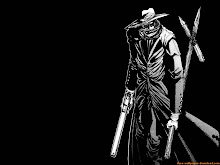
'If the doors of perception were cleansed
every thing would appear to man as it is:
infinite.
For man has closed himself up,
till he sees all things thro' narrow chinks
of his cavern'.
The marriage of heaven and hell.
William Blake (1757-1827): visonari, poeta, dibuixant, pintor i gravador anglès. Considerat en el seu temps com a poeta fosc, al.lucinat, mancat de coherència i aliè a qualsevol tradició: Bad Blake.Figura autodidàctica allunyada dels mitjans acadèmics convencionals. La seva passió pel coneixement el va dur a una sistemàtica i meditada lectura dels grans pensadors, místics i poetes de totes les èpoques.
"Esta ha sido mi herencia celestial:
Milton me amó de niño y me descubrió el rostro
Ezna vino con Isaías el profeta,
pero en años de madurez, Shakespeare me tendió su mano
Paracelso y Böhme se presentaron ante mí,
grandes terrores aparecieron en los cielos
y abajo en los infiernos: un cambio extraordinario
y terrible amenazaba la tierra".
Fragment de la carta a l'escultor i amic J. Flaxman, 12 setembre 1800.
Milton me amó de niño y me descubrió el rostro
Ezna vino con Isaías el profeta,
pero en años de madurez, Shakespeare me tendió su mano
Paracelso y Böhme se presentaron ante mí,
grandes terrores aparecieron en los cielos
y abajo en los infiernos: un cambio extraordinario
y terrible amenazaba la tierra".
Fragment de la carta a l'escultor i amic J. Flaxman, 12 setembre 1800.
Quatre van ser els aspectes socials que es reflexaven en les seves idees i actitud: industrialització, religió organitzada, política social i relació entre sexes.Anarquista místic en contra del racionalisme llibertari de l'època, denunciava sistemàticament els abusos de poder i de la propietat privada.
"¿Con qué sentido exige el párroco su diezmo al campesino?
Cuáles son sus trampas, cebos y artimañas,
cómo le circunda con bosques de soledad,
con fríos diluvios de abstracción,
para que levante castillos y enhiestos pináculos
en que reyes y sacerdotes puedan morir."
Visiones de las hijas de Albión,5: 17-20.
Cuáles son sus trampas, cebos y artimañas,
cómo le circunda con bosques de soledad,
con fríos diluvios de abstracción,
para que levante castillos y enhiestos pináculos
en que reyes y sacerdotes puedan morir."
Visiones de las hijas de Albión,5: 17-20.
Blake criticava l'opressió de l'Estat, denunciant la pobresa econòmica que patia la gent: estava en contra de qualsevol forma d'autoritarisme, tant a nivell polític, com religiós, sexual o artístic. Ell veia clarament la mecanització de l'univers, i que aquesta comportaria paral.lelament la mecanització de la societat i de la propia imatge que l'home rebia d'ell mateix. La substitució de la religió per la raó era suplantar un error per un altre, perquè comportava la deshumanització social.
"Ver un mundo en un grano de arena
y el cielo en una flor silvestre,
abarcar el infinito en la palma de la mano
y la eternidad en sólo una hora."
Augurios de Inocencia.
y el cielo en una flor silvestre,
abarcar el infinito en la palma de la mano
y la eternidad en sólo una hora."
Augurios de Inocencia.
Blake estimava l'aventura del coneixement, en veure-hi implícita, en ella, la unió de la inocència i de l'experiència. Però, també veia que, l'educació en mans de la classe dirigent seria controlada en benefici dels seus propis interessos, com a mitjà de propaganda.
"Vuelvo la mirada hacia escuelas y universidades de Europa
y veo allí el telar de Locke y su trama, causa de horribles estragos,
bañado por las ruedas hidráulicas de Newton. Negro paño
que se enrosca pesadamente en las naciones: con crueles mecanismos
de múltiples ruedas, las cuales contemplo,
rueda moviendo a la rueda con tiránicos dientes
moviéndose por compulsión unas a otras,
no como sucede en Edén donde, rueda dentro de la rueda,
giran en libertad, paz y armonia."
Jerusalén, 15: 14-20.
y veo allí el telar de Locke y su trama, causa de horribles estragos,
bañado por las ruedas hidráulicas de Newton. Negro paño
que se enrosca pesadamente en las naciones: con crueles mecanismos
de múltiples ruedas, las cuales contemplo,
rueda moviendo a la rueda con tiránicos dientes
moviéndose por compulsión unas a otras,
no como sucede en Edén donde, rueda dentro de la rueda,
giran en libertad, paz y armonia."
Jerusalén, 15: 14-20.
Blake considerava el poeta com a un visionari, un vident dotat de la facultat de penetrar en la veritat fantàstica dels cosmos, exaltant l'activitat creadora de la imaginació.
"Un profeta es alguien que ve, no un dictador arbitrario."
Anotaciones a Watson.
Anotaciones a Watson.
Bad Blake: dualista gnòstic, filòsof de contraris, crític davant la religió i la raó, poeta complex amb gran capacitat de síntesi i àgil dialèctica. Poeta pre-romàntic. Artista sui generis. Mag de l'ambigüetat, situat al final de la tradició puritana on el radicalisme gnòstic anava de la mà del fervor religiós. No entès en el seu temps.Com deia ell: tot dependrà del que es vol veure.
"The hours of folly are measur'd by the clock
but of wisdom: no clock can measure."
Proverbs of Hell.
but of wisdom: no clock can measure."
Proverbs of Hell.
Tanco el calaix, després de rellegir i reescriure unes velles paraules: William Blake, 25.09.07





